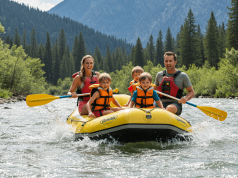The world is a breathtaking tapestry of cultures, landscapes, and experiences, and the desire to explore it is a deeply human one. For decades, the travel narrative was about ticking off bucket lists, seeing iconic sights, and collecting passport stamps. But a powerful shift is underway. Today’s conscious traveler is asking a more profound question: How can we explore the world not just for our own enrichment, but in a way that enriches the places and people we visit?
Welcome to the world of sustainable and responsible travel. It’s a movement that goes beyond reusable water bottles and carbon offsets (though those are important!). It’s a holistic philosophy centered on making a positive impact—environmentally, culturally, and economically. It’s about transforming our journeys from extractive experiences into regenerative ones. This guide is your roadmap to becoming a more mindful, ethical, and impactful traveler, proving that you don’t have to sacrifice adventure to be a force for good.
The Three Pillars: Understanding the Core of Responsible Travel
To travel responsibly, it helps to understand its foundational principles. Think of it as a three-legged stool: if one leg is weak, the entire structure becomes unstable. True sustainable tourism balances environmental, socio-cultural, and economic considerations.
1. The Environmental Pillar: Preserving Our Planet

This is often the most visible aspect of sustainable travel. It involves minimizing your negative impact on the natural world. This means more than just not littering. It encompasses everything from the carbon emissions of your flight to the water consumed by your hotel. The goal is to conserve natural resources, protect biodiversity, and reduce pollution. It’s about ensuring that the pristine beaches, lush rainforests, and vibrant coral reefs we travel so far to see are still there for future generations to enjoy.
2. The Socio-Cultural Pillar: Honoring People and Heritage
Travel is a powerful bridge between cultures. The socio-cultural pillar is about ensuring that a bridge is built on a foundation of respect. It means honoring local traditions, customs, and heritage. It involves authentic, positive interactions that empower local communities rather than commodifying them. This pillar challenges us to be humble guests, to listen and learn, to ask for permission before taking a photograph, and to understand that we are visitors in someone else’s home. It’s about celebrating cultural diversity without diluting or disrespecting it.
3. The Economic Pillar: Supporting Local Livelihoods
Where does your money go when you travel? The economic pillar focuses on ensuring that tourism revenue benefits the local community directly. So much of the money spent in mainstream tourism “leaks” out of the local economy and into the pockets of large, foreign-owned corporations. Responsible travel aims to plug those leaks. This means making conscious choices to support locally owned businesses—from guesthouses and restaurants to tour guides and artisans. When your spending empowers local entrepreneurs and contributes to community development, your trip becomes a direct investment in the destination’s well-being.
Before You Go: Planning Your Conscious Trip
A truly sustainable journey begins long before you pack your bags. Thoughtful planning is the most critical step in minimizing your negative impact and maximizing your positive contribution.
Choose Your Destination Mindfully
Consider destinations that are actively working towards sustainability. Look for countries or regions with strong environmental protections, community-based tourism initiatives, and a commitment to preserving cultural heritage. Also, think about overtourism. While places like Venice or Machu Picchu are popular for a reason, visiting during the off-season or, better yet, exploring lesser-known but equally incredible destinations can relieve pressure on overburdened infrastructure and ecosystems. A trip to a national park in a developing country or a rural community-run project can often have a more profound positive impact.
Select Eco-Friendly Accommodations
Your choice of where to stay can make a huge difference. Steer clear of large, all-inclusive resorts that often import food and export profits. Instead, look for:
- Locally owned guesthouses and boutique hotels: This ensures your money stays within the community.
- Eco-lodges: These are specifically designed to have a minimal environmental footprint, often utilizing renewable energy, water conservation systems, and sustainable materials.
- Homestays: Offer an unparalleled opportunity for cultural immersion and a direct way to support a local family.
- Certified properties: Look for certifications like Green Globe, LEED, or Fair Trade Tourism, which audit properties based on strict sustainability criteria.
Pack Light and Pack Smart
Every kilogram in your suitcase contributes to the aircraft’s weight and, consequently, its carbon emissions. Packing light is an easy way to reduce your footprint. More importantly, pack smart. Create a “zero-waste travel kit” to avoid single-use plastics on the road:
- Reusable water bottle with a built-in filter.
- Reusable coffee cup and travel utensils.
- A cloth tote bag for shopping.
- Solid toiletries (shampoo bars, conditioner bars, solid perfume) to reduce plastic packaging and avoid liquid restrictions.
- Reef-safe sunscreen to protect marine ecosystems.
Consider Your Carbon Footprint
Air travel is a significant contributor to carbon emissions. While it’s often unavoidable, you can make smarter choices. Opt for direct flights when possible, as takeoffs and landings use the most fuel. For shorter distances, choose more sustainable alternatives like trains or buses. For the emissions you can’t avoid, consider purchasing carbon offsets. Use a reputable program (look for Gold Standard or Verified Carbon Standard certification) that invests in renewable energy projects, reforestation, or community-based energy efficiency initiatives.
On the Ground: Traveling with Awareness and Respect
Once you’ve arrived, your daily choices continue to shape the impact of your trip. This is where mindfulness and awareness become your most important travel companions.
Move Like a Local
Ditch the private taxis and rental cars when you can. Using public transportation like buses, subways, or trains is not only better for the environment but also offers a more authentic glimpse into daily life. For shorter distances, walking or cycling are the best options—they are free, produce zero emissions, and allow you to discover hidden gems you’d otherwise miss.
Embrace the “Leave No Trace” Ethos
This principle, born in the wilderness, applies everywhere. It means leaving a place better than you found it. Pack out everything you pack in, including organic waste like fruit peels in sensitive environments. Stay on marked trails to prevent erosion and protect delicate flora. Conserve water, especially in arid destinations—take shorter showers and reuse towels. Turn off the lights and air conditioning when you leave your room.
Eat and Shop Locally
Actively seek out restaurants that serve locally sourced food. This not only gives you a true taste of the region’s cuisine but also supports local farmers and reduces the carbon footprint associated with transporting ingredients. When shopping for souvenirs, avoid mass-produced trinkets and buy directly from artisans at local markets. Ask about their craft, learn the story behind the product, and pay a fair price. This ensures your money rewards their skill and helps preserve traditional crafts.
Engage with Culture Respectfully

Cultural sensitivity is paramount. Before you go, do some research on local customs, traditions, and social etiquette.
- Learn a few key phrases: A simple “hello,” “please,” and “thank you” in the local language go a long way.
- Dress appropriately: Be mindful of local standards of modesty, especially when visiting religious sites.
- Ask before you photograph: Never take a photo of a person without their explicit permission. It’s a matter of basic human dignity.
- Be a mindful observer: Watch, listen, and learn. Avoid making assumptions or judgments. Approach every interaction with humility and curiosity.
Choose Ethical Wildlife Encounters
Experiences involving animals can be a highlight of any trip, but they can also be incredibly exploitative. Never participate in activities that involve riding wild animals (like elephants), posing with sedated predators, or any performance where animals are forced to act unnaturally. Instead, support ethical wildlife tourism. This includes visiting reputable conservation centers and sanctuaries that prioritize animal welfare, or taking observation tours in national parks with guides who respect wildlife and keep a safe distance.
The Ripple Effect: Bringing Your Conscious Mindset Home
A responsible trip doesn’t end when you return home. The experiences and lessons learned can create a lasting ripple effect in your own life and inspire others.
Share Your Story Responsibly
When you post about your travels on social media or share stories with friends, focus on the deeper connections you made. Talk about the amazing local guide you hired, the delicious meal at a family-run restaurant, or what you learned about a local conservation project. By highlighting these meaningful experiences, you can inspire others to travel more thoughtfully and challenge the superficial narratives often portrayed online.
Continue Your Support
Did you fall in love with a particular craft? See if you can buy from that artisan or a related fair-trade co-op online. Were you moved by a local NGO’s work? Consider making a small donation. Your connection to a place doesn’t have to sever when you leave. Continuing your support from afar is a powerful way to maintain the relationship.
Conclusion: A Journey of a Thousand Small Steps
Becoming a sustainable traveler is not about perfection; it’s about intention. It’s a journey of making better, more informed choices, one step at a time. It’s understanding that travel is a privilege, and with that privilege comes a responsibility to be a good global citizen.
By embracing these principles, you don’t just see the world—you become an active participant in its preservation and prosperity. Your travels will be richer, your connections deeper, and your memories more meaningful. You will return home not just with souvenirs, but with a renewed sense of purpose and a profound understanding that every journey, no matter how small, has the power to change the world for the better.







